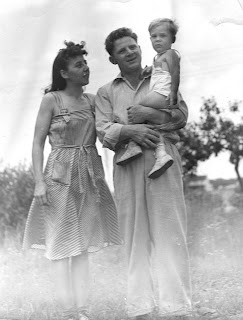I grew up with wine.
It has stained my DNA.
From
the half a dozen wooden barrels of wine in our cellar to the plain gallon jug
in the kitchen, wine was a constant presence in our home.
The small vineyard that once
provided the grapes for my grand father’s winery could easily be seen from our
kitchen window. I’ve been told he had the first commercial winery in southern
New Jersey, producing a Claret that was sold behind a label reading – Father
& Son
brand Claret.
Apparently it was a commercial success,
until Prohibition shut is down in the 1920s.
It wasn’t a vast vineyard, but to a young boy the canopied
rows of grapes seemed endless. By
the time I arrived on the scene it occupied about two acres of the twenty plus
acre farm, perhaps a bit more. It
is possible it was larger during the commercial wine making days. There are
many things I remember fondly from my early childhood, the persimmon, apple,
and pear trees, my pony, the family cow… but more than anything else, I
remember, and miss, the grapes. I
loved to walk between the rows in the late summer when the grapes were ready
for picking. The broad leaves
reached above my head keeping out the sun, creating the perfect summer hide
away. But the real treasure was
the delectable fruit, just hanging there waiting for me. My favorite grapes were in the first 3
rows, large yellow and light red grapes (Niagara?) that I could squeeze and pop
the pulp out of the skin into my mouth.
Oh they were good! The rest of the vineyard was given to the deep blue
concord variety, also quite tasty, but smaller and less juicy.
I have the faintest memory of harvesting the grapes…I was
probably 5-6 years old and I remember a lot of people walking through the rows filling
their baskets with lush bunches of grapes. To pick them my father put a funny ring on his middle
finger; it had a curved blade on the top that was used to cut the stem with a
simple swift flick of the wrist.
The grapes were carried to the yard between our house and one of the barns
where a press had been set up.
Much to my dismay I cannot remember the actual pressing and the steps
that obviously followed. I can say
with authority that I never saw anyone stomping on the grapes. Another distressing gap in my memory is
when the vineyard was removed, but maybe that’s good.
Every year my father and grandfather would
make 4 or 5 barrels of wine that were kept in a small alcove in our cellar. I
would occasionally help myself to a taste using a Mason jar lid. I thought it was cool, but the truth
is, I didn’t like it. . A gallon
of red wine was a fixture in our kitchen, often on the floor by my father or
grandfather at dinnertime. They drank from small juice glasses, never the
stemmed wine glasses we see today.
One year tragedy struck, and
all the wine ended up as vinegar.
In a fit of anger my father opened the taps in all the barrels and let the
wine drain onto the dirt floor.
You can only use so much red wine vinegar. The basement never smelled the same after that.
Like so many first generation
Italian-Americans, my father made wine every year, even long after the grapes
were gone. He did this his entire
life excluding the few years his health prevented him from doing so. The wooden
barrels where eventually replaced by five gallon glass and plastic containers,
and he had to purchase the grapes from commercial suppliers. But the wine was distinctly his
own. My mother would join in
making dandelion and peach wine.
When friends and relatives came to visit they
never left without first having coffee, wine, and more often than not,
food. Until he died, all of my
visits to my uncle Ferrar, dad’s older brother, began with a glass of wine
along with some bread, cheese, and perhaps peppers and/or salami. Of course he made his own wine, as did
my uncle Ren, another older brother, who left the farm and moved to Long
Island. (His name was Communardo, but everyone called him Ren...quite
understandable.) He had his own
grape arbor in the back yard.
I enjoy a small juice glass of red wine every
day at lunch. It is my way of
celebrating my father and grandfather.
And I enjoy wine with my dinner, but I enjoy it more when I am sitting
with one or more friends and neighbors in our kitchen or on our porch. It is a
quiet way of saying, “I am glad your here with me”. It is a gesture of friendship and hospitality.
Family, friendship, and hospitality – that sounds
a lot like love to me.
About a year ago someone brought us a bottle of wine, a
label I did not recognize, and as soon as I opened it the aroma of the Niagara
grapes immediately brought me back to our farm, the grapes, and the wine. If I closed my eyes I could have been
standing between the rows of grapes in our modest vineyard. It was the first time since my
childhood that I experienced that fragrance.

















